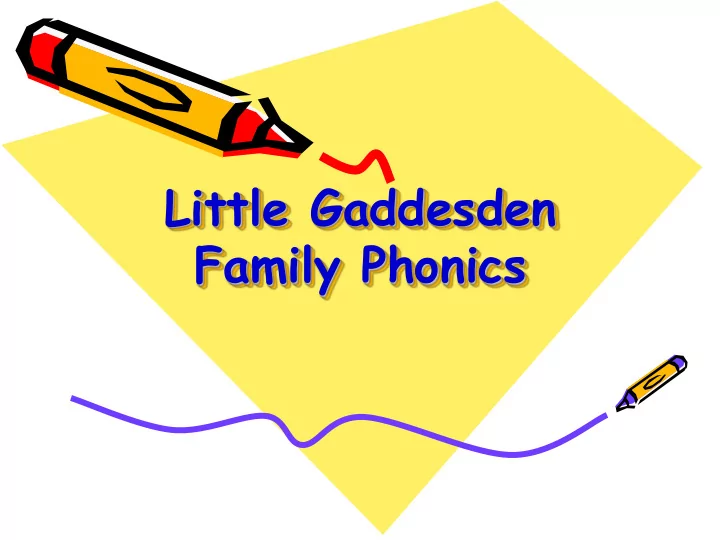

Little Gaddesden Family Phonics
What is phonics and how can I help my child at home?
Phonics is all about using … knowledge skills for of the reading and + alphabet spelling Learning phonics will help your child to become a good reader and writer.
Every child in EYFS(Class 1) and KS1 (Class 2) has a daily phonics session at their level. In KS2 children continue to learn phonics. Phonics gradually progresses to learning spellings – rules etc.
Daily Phonics Every day the children have a session of phonics with: • a fast paced approach • lessons which encompass a range of games, songs and rhymes We use Jolly phonics at the start of EYFS along with the Sounds-Write programme to support the teaching of phonics. This is a recommended scheme compatible with the Government’s own ‘Letters and Sounds’ document. .
Phonic terms your child will learn at school • Phoneme • Grapheme • Blending • Segmenting • Digraph • Phoneme frame • Sound button • Tricky words • CVC
Glossary: • Phonemes: The smallest units of sound that are found within a word • Grapheme: The spelling of the sound e.g. Th • Diagraph: Two letters that make one sound when read • CVC: Stands for consonant, vowel, consonant. • Segmenting: Breaking up a word into its sounds. • Blending : Putting the sounds together to read a word • Tricky words: Words that cannot easily be decoded.
Phonics Words Your children will learn to use the term: Blending • Children need to be able to hear the separate sounds in a word and then blend them together to say the whole word .
Blending /b/ /e/ /d/ = bed /t/ /i/ /n/ = tin /m/ /u/ /g/ = mug
Phonics Words Your children will learn to use the term: Segmenting • Children need to be able to hear a whole word and say every sound that they hear .
Segmenting bed = /b/ /e/ /d/ tin= /t/ /i/ /n/ mug= /m/ /u/ /g/
Phonics Words Your children will learn to use the term: phoneme Phonemes are sounds that can be heard in words e.g. c-a-t
Phonics words Phoneme frame and sound buttons c a t . . . f i sh . . _
Phonics Words Your children will learn to use the term: grapheme This is how a phoneme is written down
Phonics Words Your children will learn to use the term: digraph This means that the phoneme comprises of two letters e.g. ll, ff, ck, ss
Tricky Words There are many words that cannot be blended or segmented because they are irregular. the was said you some
How can I help at home? • Nursery rhymes, songs, action rhymes. • Add sound effects to stories. • Music and movement: rhythm, guess the instrument. • Talking about sounds: listening walks, loud/soft, high/low, silly noises. •Speaking & listening: silly sentences “Happy Harry hops”, mimics, animal sounds.
Getting ready for phonics 1 . Tuning into sounds 2. Listening and remembering sounds 3. Talking about sounds Music and movement Rhythm and rhyme Sound effects Speaking and listening skills
Saying the sounds • Sounds should be articulated clearly and precisely. http://www.teachfind.com/national-strategies/letter-and- sounds-%E2%80%93-articulation-phonemes-vowels-and- consonants
How can I help at home? Oral blending: the robot game Children need to practise hearing a series of spoken sounds and merging them together to make a word. For example, you say ‘b -u- s’ , and your child says ‘bus’. “What’s in the box?” is a great game for practising this skill.
Learning phonemes to read and write simple words • Children will learn their first 36 phonemes in Reception : s a t p i n m d g o c k e u z r h f b v l y w j q x moving onto 2 letters but just 1 sound ck (as in duck) sh ch th oo (as in moon and also book) ff (as in puff) ll ss zz ee or oa ar ur ow oi er • They will use these phonemes to read and spell simple “consonant -vowel- consonant” (CVC) words: sat, tap, dig, duck, rug, puff, hill, hiss All these words contain 3 phonemes.
• Leading onto VCC,CVCC,CCVC and CCVCC words like imp, lips, frog and crept • Next we learn 3 letters 1 sound igh ear ure air • They will then consolidate these phonemes as they learn to blend, segment, read and write.
Class 2 (KS1) Children move on to learn further units of sounds eg: ay ai ou ie ee oy ur ue aw wh ph ew oe au ey a_e e_e i_e o_e u_e oul They will use these phonemes to read and spell words: pain, cake, tray, steak, baby
Is there anything I can do at home? y e s
How can I help at home? • When spelling, encourage your child to think about what “looks right”. • Encourage your child to say each sound as they practise their spellings. • Phonic work in the ‘Words and Sounds’ book for every child in Reception • Read EVERY day with your child
Don’t forget… Learning to read should be fun for both children and parents.
Recommend
More recommend